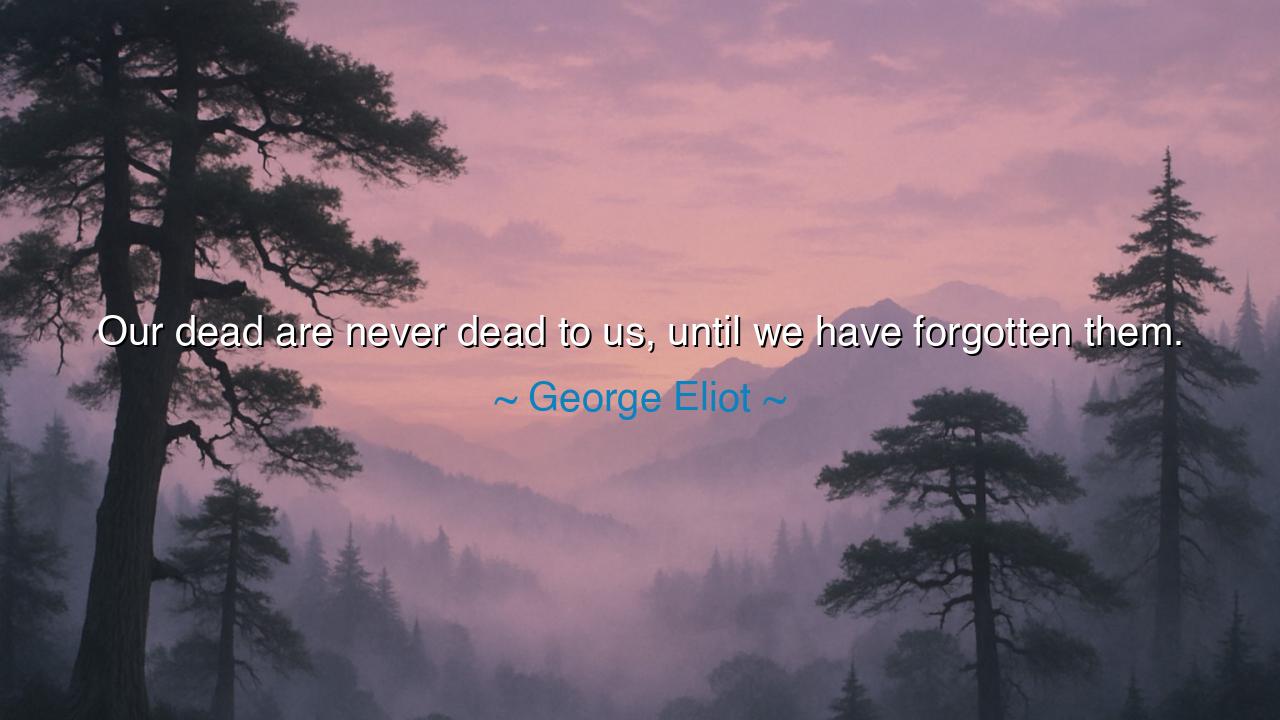
Our dead are never dead to us, until we have forgotten them.






“Our dead are never dead to us, until we have forgotten them.” — George Eliot
In these luminous and solemn words, George Eliot — the pen name of Mary Ann Evans, one of the great novelists and thinkers of the nineteenth century — speaks to the immortal power of memory and love. She reminds us that death does not end presence, but only transforms it. When she says, “Our dead are never dead to us,” she speaks not of ghosts or shadows, but of the living spirit that endures in remembrance. So long as we hold their faces in our minds, their laughter in our hearts, their virtues in our deeds, they remain among us — unseen, yet near. But when we forget, when we let their memory fade like mist before the sun, only then do they truly die. Forgetfulness, not the grave, is the end of being.
To understand her words, we must know something of Eliot’s soul. Though she lived in an age of faith’s decline, her heart still sought the sacred — not in the heavens, but in human compassion, loyalty, and memory. She had known loss herself and had seen how grief, though it wounds, also sanctifies. From this insight grew her belief that love gives life a second time — that remembrance is the resurrection of the spirit in the heart of the living. To Eliot, the dead are not gone; they dwell in the quiet chambers of those who remember. They live in our choices, our virtues, our echoes of their courage and kindness.
The ancients, too, held this truth as sacred. The Greeks honored their dead with song and story, believing that to be remembered was to remain immortal. The Egyptians built their tombs not for decay but for eternity, convinced that memory preserved the soul’s passage. In Rome, families kept masks of their ancestors in their homes and spoke their names on holy days, so that their spirits would never vanish from the world. Thus, across all ages, humanity has known that remembrance is a kind of prayer — the bridge between what has perished and what still breathes. Eliot, in her wisdom, gave voice once more to this eternal law of love: that death ends the body, but only forgetfulness can end the soul.
There is a story from the aftermath of war — of a mother who, having lost her son on a distant battlefield, tended his empty room each morning, as though he might return. When asked why she did this, she answered, “Because as long as I remember him, he is still my son.” In her sorrow, she lived the very meaning of Eliot’s words. Her grief was not a refusal of death, but an act of faith in love’s endurance. She knew that though her son’s voice no longer filled the air, it still filled her heart. And so it is for all of us: memory is the garden where the departed bloom again.
When Eliot wrote these words, she was not writing of mourning alone, but of continuity — of the sacred duty we bear to those who came before us. Our ancestors live in our language, our customs, our courage. Every good deed we perform, every kindness we show, becomes a whisper of their influence. To forget them would be to deny ourselves, for we are their living legacy. In this way, memory is not only comfort — it is identity, the thread that binds generations into one vast tapestry of being.
But the warning in her words is as clear as the comfort: when we forget the dead, when we cast their names into silence, we become poor in spirit. A people without memory is a tree without roots, easily toppled by the storm. Therefore, remembrance is not mere sentiment — it is duty, heritage, and strength. To remember is to give meaning to the past and direction to the future. The dead rely upon the living to speak their names; the living rely upon the dead to remind them of what endures.
Lesson:
From George Eliot’s wisdom, let us learn that love and memory are the true conquerors of death. Keep those you have lost alive within you — not by clinging to sorrow, but by living as they would have you live. Tell their stories. Speak their names. Pass on their virtues to those who come after. When you act with kindness, let it be in their honor; when you face hardship, let their strength be your guide. For as long as remembrance lives, our dead are never dead to us — they walk beside us in silence, breathing through our actions, living in our hearts, and shining, eternal, in the light of memory.






AAdministratorAdministrator
Welcome, honored guests. Please leave a comment, we will respond soon